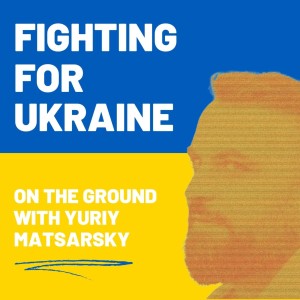
October 23rd 2024
Yuriy recounts the tragic effects of the war on everyday life, emphasizing the shift in mindset even among children. As he shares heart-breaking stories of loss and fear, the harsh reality of living in a constant state of danger becomes evident.
You can email Yuriy, ask him questions or simply send him a message of support: fightingtherussianbeast@gmail.com
You can help Yuriy and his family by donating to his GoFundMe: https://www.gofundme.com/f/help-yuriys-family
Yuriy’s Podbean Patron sign-up to give once or regularly: https://patron.podbean.com/yuriy
Buy Yuriy a coffee here: https://bmc.link/yuriymat
Subscribe to his substack: https://yuriymatsarsky.substack.com/
TRANSCRIPT: (Apple Podcasts & Podbean app users can enjoy accurate closed captions)
It's October 23.
Russians killed a 14-year-old girl in Sumy. They simply sheltered with city and hit her while she was walking her dog. The dog is gravely injured and its honor is dead. In Kherson a Russian FPV drone killed a doctor while he was driving to a patient. Near Kharkiv, a bread truck driver died after ran over a mine, left by Russians. Russian missiles flew several thousand kilometers and killed a mother and her three daughters in Lviv.
Russians kill civilians every day. Every single day. All over Ukraine. Imagine we are the largest country in Europe- almost twice the size of Germany, yet there are no safe places here. Our insane neighbor can strike anywhere. And it's been like this for nearly three years now. In these three years, we have turned into a nation of fatalists. I constantly hear people, both civilians and soldiers, talking about the future, saying things like "if I survive" or "if I'm not killed by them."
It's become so common that it no longer sounds jarring as it did few years ago. Everyone talks like this now, warning that we might not be able to do something or travel somewhere if they get wounded or killed by the next Russian attack. This has long become a crucial factor in planning anything. But for a long time, I fought this, only applied to adults. And do you know why? Because I hadn't been around children for a while. But recently, I had to be.
About a week ago, I was waiting out a very loud shelling taking shelter under the canopy of an entrance of some building I was walking by when the shelling started. It's already a habit -if you get caught outside during a shelling, find some sort of roof to avoid getting hit by shrapnel. Next to me was a young woman with a boy of about six years old. When an explosion went off very close by the child had a full blown panic attack. He turned pale, started shaking, and it seemed like he was about to pass out from fear. His mother, hugging him, started telling him how we would break a pie together in the evening, how we would go for a walk when the shelling stopped, and how we would watch his favorite cartoon before bed.
Listen, I just hadn't thought about this. I didn't really understand how children experience the war. They live in constant fear and it's much harder for them than for adults. And they no longer say, "when I grow up" they say "if I grow up." At the very least, that boy asked his mother, if I grow up and finish school, will the war still be going on?
No comments yet. Be the first to say something!